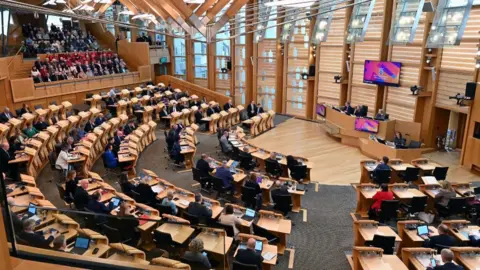MSP pay to rise by 3.2% to almost £75,000
 Getty Images
Getty ImagesMSPs are to get a pay rise of more than £2,000 this year, it has been confirmed.
The 3.2% increase, recommended by the Scottish Parliamentary Corporate Body (SPCB), brings the basic salary for Holyrood parliamentarians to £74,506.
The SPCB – a management body made up of five MSPs – said the pay hike was in line with inflation under the Average Weekly Earnings (AWE) index.
The total cost of MSP salaries and associated taxes is expected to rise by £645,000 to almost £15.3m, including an extra £200,000 due to an increase in employers' National Insurance.
The £2,311 pay rise, to apply from 1 April, follows hikes of 6.7% last year, 1.5% the year before and 3.4% in 2022-23.
Until last year, MSPs' salaries were based on the Office for National Statistics annual survey of hours and earnings (ASHE).
However, the SPCB said this had become "misaligned" with other measures in recent years. It highlighted that the ASHE mean was recently reported at 6.7%, "further evidencing the misalignment".
Last month, the UK inflation rate recorded at 2.6%.
The pay rise is automatically applied by the SPCB.
Ministerial pay
Ministers are entitled to extra money on top of the base rate but since April 2009 have declined to accept their full entitlement, so their take home pay remains at 2008/9 levels.
Currently, a Scottish government minister is entitled to £99,516 but under the voluntary pay freeze receives the 2008/9 level of £81,449.
A cabinet secretary has an entitlement of £118,511 but receives £96,999.
The voluntary reduction is taken from net pay and returned to the Scottish government to be made available for public spending.
A spokesperson said: "Ministerial pay has been voluntarily frozen for 15 years by Scottish ministers and there are no plans to change this."
The SPCB is chaired by the presiding officer and includes four other MSPs from the four largest parties.
It makes decisions on budgets, staffing, accommodation and security.
